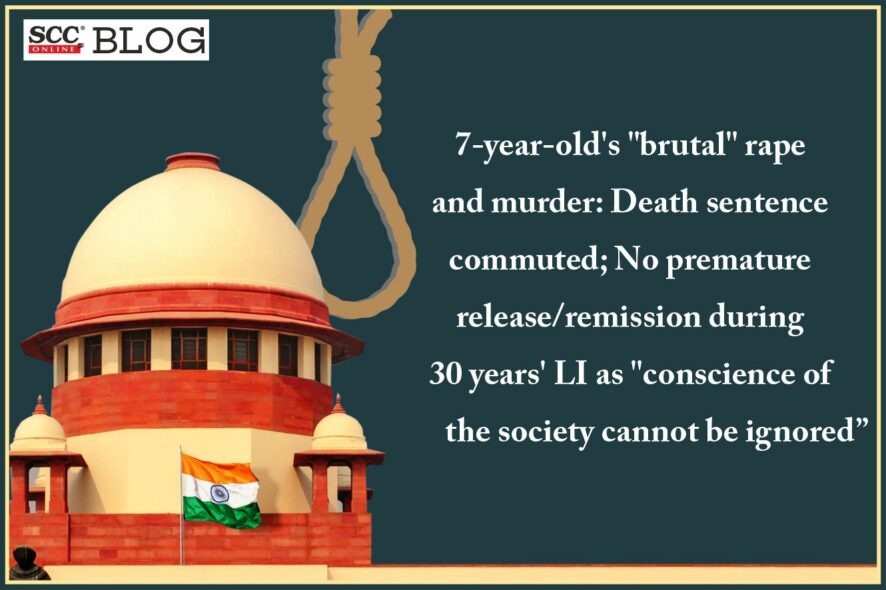Supreme Court: In a case where a man had brutally raped and murdered a 7-year-old girl, the 3-judge bench of AM Khanwilkar, Dinesh Maheshwari* and CT Ravikumar, JJ has reversed the concurrent findings of the Courts below and has commuted the death sentence into that of imprisonment for life, with the stipulation that the appellant shall not be entitled to premature release or remission before undergoing actual imprisonment for a period of 30 years.
The Court observed,
“The heinous nature of crime like that of present one, in brutal rape and murder of a seven-year-old girl child, definitely discloses aggravating circumstances, particularly when the manner of its commission shows depravity and shocks the conscience. But, at the same time, it is noticeable that the appellant has no criminal antecedents, comes from a very poor socio-economic background, has a family comprising of wife, children and aged father, and has unblemished jail conduct.”
The Trial Court and the High Court had sentenced the appellant to death for enticing a seven-year-old girl to accompany him on the pretext of picking lychee fruits; having thereafter committed rape upon the child; having caused her death; and having dumped the dead body near a bridge on the riverbank, after having dragged the dead body over a distance of one and one-quarter kilometres.
The Supreme Court, however, noticed that both the Trial Court as also the High Court have taken the abhorrent nature of crime alone to be the decisive factor for awarding death sentence in the present case.
The Trial Court convicted the appellant on 07.12.2016 and on the next day, proceeded to award the sentence. The sentencing order did not indicate if the appellant was extended reasonable opportunity to make out a case of mitigating circumstances by bringing relevant material on record. The sentencing order also failed to satisfy if the Trial Court consciously pondered over the mitigating factors before finding it to be a ‘rarest of rare’ case.
The Trial Court also observed that ‘if such heinous crime is committed by him, it is not justifiable to show any sort of mercy in the punishment.’
The High Court confirmed the order of the Trial Court, with a cursory observation that there were no substantial mitigating factors and the aggravating circumstances were aplenty, after making rather intense comments on the menace of rape and brutal murder of children as also on the society’s abhorrence of such crime.
In such circumstances, the Court observed that the approach of the Trial Court and High Court had been that the accused-appellant was about 33-34 years of age at the time of occurrence and was supposed to be sensible. The Supreme Court, hence, held that the impugned orders awarding and confirming death sentence could only be said to be of assumptive conclusions, where it has been assumed that death sentence has to be awarded because of the ghastly crime and its abhorrent nature.
Disagreeing with the concurrent findings of the Courts below, the Supreme Court held that,
“There is nothing on record to rule out the probability of reformation and rehabilitation of the appellant, in our view, it would be unsafe to treat this case as falling in ‘rarest of rare’ category.”
It observed that when the appellant is not shown to be a person having criminal antecedents and is appellant is not shown to be a person having criminal antecedents and is not a hardened criminal, it cannot be said that there is no probability of him being reformed and rehabilitated. His unblemished jail conduct and having a family of wife, children and aged father would also indicate towards the probability of his reformation.
It was, however, observed that even when the present case is taken to be not falling in the category of ‘rarest of rare’ so as to require termination of the life of the appellant yet, the impact of the offences in question on the conscience of the society as a whole cannot be ignored. Hence, commutation of death sentence to life imprisonment without application of the provisions of premature release/remission before mandatory actual imprisonment, was found to be just and reasonable.
The Court, hence, awarded the punishment of imprisonment for life to the appellant for the offence under Section 302 IPC while providing for actual imprisonment for a minimum period of 30 years. All the substantive sentences to run concurrently.
[Pappu v. State of Uttar Pradesh, 2022 SCC OnLine SC 176, decided on 09.02.22]
*Judgment by: Justice Dinesh Maheshwari







